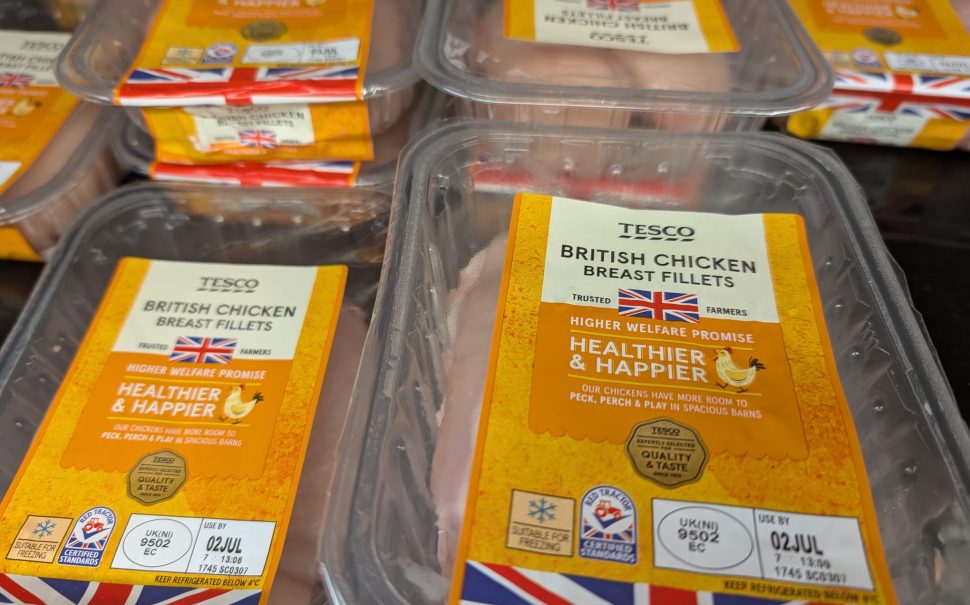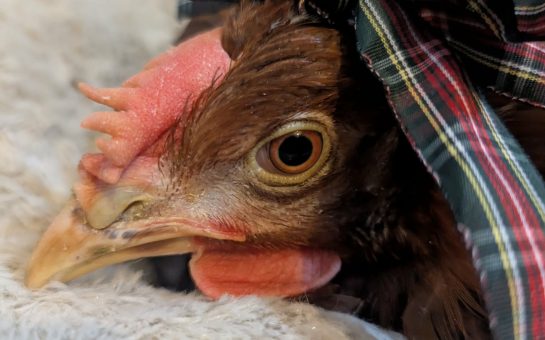UK chicken production is booming as consumption hits an all-time high, official data shows
Average monthly poultry meat production so far this year is 152,000 tonnes, one of the highest recorded, as consumption in the UK hit a high of 2.46million tonnes in total last year.
But the UK poultry industry relies entirely on chicken feed made predominantly from soybeans imported from South America, raising broader concerns about the resilience of the UK food system.
Southampton University research fellow Dr Theo Stanley, who isworking on a food system resilience project focussing on chicken, said: “Imagine if North Atlantic trade were to freeze for some reason.
“In that situation, Britain would be very, very protein depleted.
“It would be very hard to grow chickens, who require an incredibly high-protein diet.”
Production soars
UK chicken production has increased consistently for the past 30 years, totalling 1,766,900 tonnes in 2024 – that’s over 1billion birds.
Chicken meat is the most popular meat in the UK and globally.
Its consumption has been increasing annually and is predicted to continue to grow further in the coming decades.
Despite increasing production in recent years, the domestic poultry industry is not enough to satisfy demand in the UK as imports, mainly from Poland and the Netherlands, make up roughly 26% of consumption.
Intensive chicken production has led to heavily-managed and tightly-controlled breeding, producing standardised birds which are biologically tailored to maximise production and minimise cost.
A Eating Better report claims that chickens today have over twice the amount of fat of chickens consumed 50 years ago, and contain fewer essential nutrients.
‘Hooked’ on imported soybean
Chicken feed is the most crucial means for maximising the efficiency of chicken production.
Stanley said: “Each chicken body has been designed to eat an exact amount of macro nutritional content over the course of its lifetime, and that has been developed through decades of scientific research.”
High in protein, cheap and historically reliable, imported soyabean forms the base of this feed in the UK, the majority of which comes from Brazil and the USA.
According to UK Trade info, the UK imported over 1million tonnes of soyabeans last year, with 47% coming from Brazil.
Brazilian soybeans are preferred by chicken feed producers due to a higher protein content.
The poultry industry is estimated to use roughly 60% of this imported soyabean.
Stanley said: “The UK is completely hooked on soya.
“The entire chicken feed industry is set up to use South American soya, and it’s only with the import of soya from overseas countries that the efficiency that the chicken industry relies on can be delivered.”
Cheap, imported soybeans unlock global commodity prices for UK chicken, outcompeting domestically grown proteins, of which there simply aren’t enough to begin with.
Effects of imported soyabean dependency
The UK’s reliance on imported soyabean has maintained production growth and kept the price of chicken low, but it also brings a host of negative consequences.
Soyabean production is known to contribute to deforestation in South America, and a significant proportion of imported soyabeans are not deforestation certified.
Lower environmental regulation of South American soya also presents contamination risks, with Stanley explaining many in the industry concerned about the effect of mycotoxins spoiling soya shipments.
Historically reliable international trade has in-part led to the UK’s reliance on imported soyabean, but growing global trade tensions are exposing a real vulnerability to the country’s food system as a result of this lock-in.
Stanley said: “Let’s say America introduces a huge tariff on China.
“China currently purchases a lot of its soybeans from America.
“With the tariff, China would turn to Brazil to purchase its soybeans, which would effectively drive up the price of Brazilian soybeans, affecting UK imports of those same Brazilian soybeans.”
Stanley said this is something which could lead to the UK being protein depleted if alternatives are not sought.
Growing alternatives
Diversifying proteins in chicken feed is a vital step towards building resilience in UK chicken production.
Stanley said: “If the UK took seriously the threats to its own food system resilience, there could be more of a push towards growing alternative proteins in the UK.”
But diversification threatens the incredible efficiencies and margins upon which the industry currently operates, with domestically-grown alternatives likely to be less nutritionally productive and scalable than soyabean.
Dynamism and flexibility in the UK is also difficult in an industry owned and managed entirely by a handful of large multinational companies, including Faccenda, Moy Park, Cargill, 2 Sisters and Banham Poultry.
Recent years have seen farmers leave the industry, citing increasing costs of feed as a motive, among other intensifying pressures.
Stanley said: “Most of the scientists I spoke to imagine some future protein scenario where legumes grown in the UK are grown in rotation with wheat, used for bioethanol.
“The husks and hulls and hard bits of wheat can be used as a high-protein meal.”
Some trials have found other protein-rich alternatives, such as sprouting vetch seeds.
Whilst protein diversification is important, campaigners argue that this must also be coupled with a move away from intensive poultry farming, which has led to widespread pollution of land, air and waterways surrounding poultry farms.
Currently, 95% of UK chicken is intensively farmed.
Albeit better quality, less chicken meat available would require a simultaneous move to reduce chicken consumption and diversify diets.
This is something campaigners claims could also bring a host of health and sustainability benefits.
Feature image: Adam Termote




Join the discussion